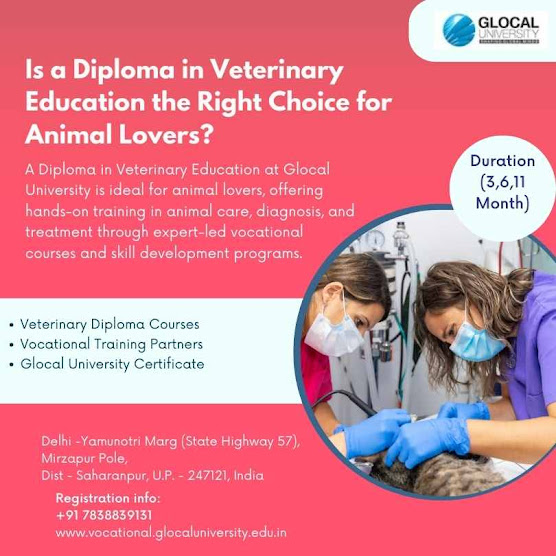For those who have a passion for animal care and welfare, a Diploma in Veterinary Education is an excellent career path. This program is designed to provide essential knowledge and practical skills in veterinary sciences, preparing students for roles in animal healthcare, research, and clinical settings. Whether you aspire to work in veterinary clinics, animal shelters, or livestock management, this diploma offers a strong foundation in veterinary medicine.
What is a Diploma in Veterinary Education?
A Diploma in Veterinary Education is a specialized veterinary diploma program that provides in-depth knowledge of animal health, disease prevention, and treatment techniques. Unlike a full veterinary degree, which takes several years to complete, this diploma serves as a skill course in veterinary education that focuses on practical training and hands-on experience.
Veterinary Course Duration and Structure
The veterinary course duration for a diploma typically ranges from 1 to 2 years, depending on the institution and curriculum. Some courses may include internship opportunities, allowing students to gain real-world experience in veterinary hospitals, farms, and research centers.
Core Subjects Covered in Veterinary Diploma Courses:
Animal anatomy and physiology
Veterinary pathology and pharmacology
Clinical procedures and surgical techniques
Animal nutrition and diet management
Livestock health and disease control
Pet care and emergency response
Advantages of Pursuing a Veterinary Diploma
Choosing a Diploma in Veterinary Education offers several advantages for animal lovers who wish to build a career in this field:
Shorter Course Duration: Unlike a full-fledged veterinary degree, diploma courses can be completed in a shorter time, allowing graduates to enter the workforce quickly.
Hands-on Training: Emphasis on practical skills ensures that students gain real-world experience in animal treatment and care.
Wide Career Opportunities: Graduates can work in veterinary clinics, animal welfare organizations, government agencies, and the livestock industry.
Cost-Effective Education: Compared to full-degree programs, veterinary diploma courses are more affordable and accessible.
Pathway to Advanced Studies: The diploma serves as a stepping stone for further specialization in veterinary medicine.
Veterinary Vocational Course: A Practical Learning Approach
A veterinary vocational course focuses on skill-based learning, helping students develop expertise in animal healthcare. Unlike traditional academic programs, vocational training emphasizes real-world applications, making graduates job-ready upon completion.
Diploma in Veterinary Medicine: Career Prospects
A Diploma in Veterinary Medicine opens up numerous career opportunities in the animal healthcare sector. Some of the common job roles include:
Veterinary Assistant: Assisting veterinarians in clinical procedures and animal care.
Animal Health Technician: Conducting health assessments and administering treatments.
Livestock Supervisor: Managing the health and welfare of farm animals.
Animal Shelter Worker: Providing medical care to rescued and abandoned animals.
Pet Grooming Specialist: Ensuring the hygiene and well-being of domestic pets.
Lab Technician in Veterinary Research: Assisting in animal research studies and drug testing.
Role of Vocational Training Partners in Veterinary Education
Institutions offering veterinary diploma courses collaborate with vocational training partners to ensure high-quality education and practical exposure. These partners provide:
Internship and apprenticeship opportunities
Hands-on training in real veterinary settings
Industry-aligned curriculum and certifications
Skill Development Training Partner: Enhancing Practical Knowledge
A skill development training partner plays a crucial role in equipping students with the necessary skills to excel in veterinary practice. Through structured programs, students gain experience in diagnosing diseases, handling animals, and performing minor surgical procedures.
Glocal University: A Leading Institution for Veterinary Education
Glocal University is a reputable institution offering vocational training in veterinary education. Their Diploma in Veterinary Education is designed to provide students with industry-relevant skills, ensuring they are well-prepared for careers in animal healthcare.
Why Choose Glocal University for a Veterinary Diploma?
Comprehensive Curriculum: Covering both theoretical and practical aspects of veterinary medicine.
Experienced Faculty: Learning from industry experts and veterinary professionals.
Hands-on Training: Real-world exposure through internships and fieldwork.
Recognition & Accreditation: A vocational training certificate from a recognized institution enhances career prospects.
Importance of a Vocational Training Certificate
A vocational training certificate in veterinary education is a valuable credential that validates your skills and knowledge. It boosts employability and serves as a qualification for various roles in the animal healthcare sector.
Benefits of a Vocational Training Certificate:
Provides credibility as a trained veterinary professional
Enhances job opportunities in veterinary clinics, hospitals, and animal care centers
Acts as a foundation for further specialization in veterinary sciences
Recognized by veterinary and animal welfare organizations
Read Also: Is CMS & ED a Recognized and Valuable Medical Certification?
Conclusion
For animal lovers passionate about animal healthcare, a Diploma in Veterinary Education is an ideal choice. It offers a practical and skill-based learning approach that prepares students for various careers in veterinary medicine. Institutions like Glocal University provide high-quality vocational training, ensuring graduates are job-ready. With support from vocational training partners and skill development training partners, this diploma serves as a gateway to a fulfilling and impactful career in veterinary sciences.

